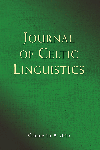
The Syntax of the Verbal Noun in Manx Gaelic
This paper focuses particularly on the way pronominal objects of verbal nouns are expressed (whether by means of a possessive proclitic or as an object personal pronoun), and how this is related to the changing analysis of the verbal noun in Manx (and to varying extents the other Celtic languages), from a noun to a non-finite verb. The shift is examined in terms of reanalysis and grammaticalization, with particular reference to the common cross-linguistic phenomenon of the development of verbal nouns into infinitives and other non-finite verbal elements.
Document Type: Research Article
Publication date: 01 January 2016
The Journal of Celtic Linguistics publishes articles and reviews on all aspects of the linguistics of the Celtic languages, modern, medieval and ancient, with particular emphasis on synchronic studies, while not excluding diachronic and comparative-historical work. This journal is of great interest to students of languages and Celtic studies, as well as members of the general public interested in the linguistic progression within Celtic languages and linguistic history. The editor is Lecturer in the Welsh Department at Aberystwyth University, and is supported by an editorial board including representatives from Oxford and Cambridge universities, and from universities across Europe and North America. Papers are invited in English, French or German on all fields/‘levels’ of analysis; phonology, morphology, syntax, semantics, pragmatics; formal or functional, cross-language typological or language-internal, dialectological or sociolinguistic, any theoretical paradigm.
Mae’r Journal of Celtic Linguistics yn cynnwys erthyglau ac adolygiadau ar bob agwedd ar ieithoedd Celtaidd - modern, canoloesol a hynafol - gyda phwyslais arbennig ar astudiaethau syncronig, a heb eithrio gwaith diacronig a hanesyddol-gymharol. Y mae’r cyfnodolyn hwn yn ddefnyddiol i fyfyrwyr sydd yn astudio ieithoedd ac astudiaethau Celtaidd, yn ogystal â darllenwyr sy’n ymddiddori yn hanes datblygiadau’r ieithoedd Celtaidd. Mae’r golygydd yn Ddarlithydd yn Adran y Gymraeg, Prifysgol Aberystwyth, ac yn cydweithio â’r bwrdd golygyddol sydd â chynrychiolaeth o brifysgolion Rhydychen, Caergrawnt, ac o brifysgolion ledled Ewrop a Gogledd America.
- Information for Authors
- Subscribe to this Title
- Ingenta Connect is not responsible for the content or availability of external websites
- Access Key
- Free content
- Partial Free content
- New content
- Open access content
- Partial Open access content
- Subscribed content
- Partial Subscribed content
- Free trial content